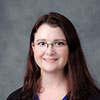This article is more than 5 years old.
This past Summer, Special Collections and Archives (SCA) director Tanya Zanish-Belcher approached me about working with some of their oral histories to look at the viability of using Doug A Boyd’s Oral History Metadata Synchronizer (OHMS) with their collections. At my previous university, we used OHMS for our oral histories, and I had prepared some of the newer additions to the collections for upload to our digital collections.
SCA identified some oral histories, part of the History of Wake Forest Oral History Project, which were already online that needed some metadata review and confirmation. Most of this work involved looking at the different fields and seeing where information was repeated, excluded, or needed some more robust description. Once this portion was completed, it was down to listening to interviews, creating original metadata, and then collection ingest.
In 2017, the School of Divinity ran its first class of “Islam and Islamaphobia”, in which Divinity students interviewed students and affiliates of the Muslim Student Association (MSA) for the SCA Oral History Project. The Divinity students crafted the questions for the interviews and Professor Joshua Canzona worked with Director for Muslim Life Naijla Faizi to pair students and schedule interviews.
I used an oral history metadata sheet I’d been working with and entered the names of the interviewed students and information about their background. My preferred method is to examine the resources available on the person being interviewed; then listened to the interview while making rough notes on the content. On longer interviews, I use a modified abbreviation system for recurring words or themes in a series; on shorter ones, I tried to capture as word-perfect a response as I can. It’s not a perfect transcription by a long shot, but it does allow for as accurate representation as possible. Each student also signed a deed of gift and an informed consent form for SCA.
These interviews capture what Muslim life at Wake is like from multiple perspectives: some are first-generation Americans, some are from different regions that practice the Islamic faith. What is captured is a vast and diverse picture of the religion as a whole and the people that practice it. Many of the issues and desires expressed are similar: recognition, acceptance, tolerance, a desire for halal food to be more widely and easily accessible on campus. Some are unique: more funding, more space, more time. While the individual stories may be different and the experiences vary across the board, the beliefs and views expressed are both singular and yet universal. To know one is not to know all, and even to listen to many is still not to know everything.
Please enjoy the newly added Muslim Student Interviews from students of the Muslim Student Association here. You can also search the Digital Collections website using the keyword search “muslim”.

4 Comments on ‘Student Voices and Oral History’
This is a fantastic project and will be a wonderful resource into the future. Thank you!
Thank you so much, Jess, for helping make these interviews available!
Thanks for explaining your approach to this project. It’s important that you made it more relevant with metadata!
Thank you for providing such robust description for these oral histories, researchers are lucky to have it!